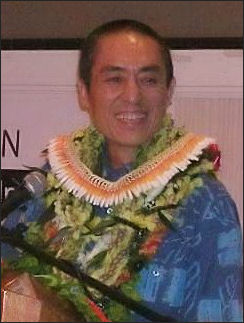ZHANG YIMOU
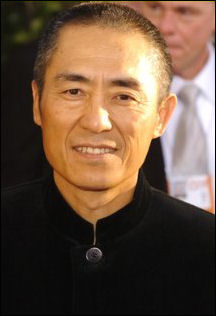
Zhang Yimou is China’s best known and arguably most talented film director. His fondness for exploring Chinese history and its affect on its people have made him a darling of international film critics but often gotten him into trouble at home. His films have won many awards. He has produced several masterpieces. In recent the quality of his work has markedly declined. Zhang was once considered the bad boy of Chinese film but now often works with the blessing of the government, which might explain this trend.
Zhang has been nominated for best foreign film Oscars three times (for “Ju Dou’ in 1990, “Raise the Red Lantern” in 1991 and “Hero” in 2003) and won a Grand Jury Prize at the Cannes Film Festival in 1994 for “To Live.” The film critic Kathy Schultz Huffhines wrote: “No other current director is capable of the bold, robust, intoxicating, frightening personal stamp Zhang Yimou puts on every frame. Give him the weeds that would be anyone else’s sow’s ear and he’ll turn them into a silk purse.” His films feature “brilliant colors, deeply felt vision of the shifting forces or life and death.” Zhang and Gong Li collaborated on a number of films and were lovers until she left him for a Singapore businessman (See Gong Li).
Director Steven Spielberg wrote in Time, “For the past two decades he has inspired the world’s fascination with China through his cinematic vision. Not since the great British director Michael Powell has a director used color so effectively.” At the heart of his work “was the idea that the conflict of man foretells the desire for inner peace? whether the films were “about the lives of humble peasants or exalted royalty.” On his Olympics extravaganza Spielberg said, “In one evening of visual and emotional splendor, he educated, enlightened and entertained us all. In doing so, Zhang secured himself a place in world history.” Spielberg said in 2013 that one of his great ambitions was to make a film with Zhang Yimou in China
Zhang has his less than charming sides. In May 2007, he was awarded an honorary degree by Boston University but failed to show up a the commencement ceremony. In 2012, China's national audit office said the ministry of railways had hired him for a five minute promotional film that cost almost $3 million. Zhang said he received $400,000 for his work and was "astonished" to learn of the total budget [Source: Tania Branigan The Guardian, May 9, 2013]
See Separate Article ZHANG YIMOU'S ACCLAIMED FILMS AND FLOPS factsanddetails.com
See Separate Articles: CHINESE FILM factsanddetails.com ; FIFTH GENERATION FILM MAKERS OF CHINA factsanddetails.com ; ZHANG YIMOU'S ACCLAIMED FILMS AND FLOPS factsanddetails.com ; ANG LEE AND HIS FILMS factsanddetails.com
Websites: Zhang Yimou at IMDB imdb.com Chinese Film Classics chinesefilmclassics.org ; Senses of Cinema sensesofcinema.com; 100 Films to Understand China radiichina.com. dGenerate Films is a New York-based distribution company that collects post-Sixth Generation independent Chinese cinema dgeneratefilms.com; Internet Movie Database (IMDb) on Chinese Film imdb.com ; Wikipedia List of Chinese Filmmakers Wikipedia ; Shelly Kraicer’s Chinese Cinema site chinesecinemas.org ; Modern Chinese Literature and Culture (MCLC) Resource List mclc.osu.edu ; Love Asia Film loveasianfilm.com; Wikipedia article on Chinese Cinema Wikipedia ; Film in China (Chinese Government site) china.org.cn ; Directory of Interent Sources newton.uor.edu ; Chinese, Japanese, and Korean CDs and DVDs at Yes Asia yesasia.com and Zoom Movie zoommovie.com
RECOMMENDED BOOKS: “Encyclopedia of Chinese Film” by Yingjin Zhang and Zhiwei Xiao Amazon.com; “The Chinese Cinema Book” by Song Hwee Lim and Julian Ward Amazon.com; “The Oxford Handbook of Chinese Cinemas by Carlos Rojas and Eileen Chow Amazon.com; “Chinese National Cinema” by Yingjin Zhang Amazon.com; “Zhang Yimou: Interviews” edited by Frances Gateward, Amazon.com; “Globalization and Contemporary Chinese Cinema: Zhang Yimou's Genre Films” by Xuelin Zhou Amazon.com; “Memoirs from the Beijing Film Academy: The Genesis of China's Fifth Generation” by Ni Zhen Amazon.com; “Representation of the Cultural Revolution in Chinese Films by the Fifth Generation Filmmakers: Zhang Yimou, Chen Kaige, and Tian Zhuangzhuang” by Ming-May Jessie Chen, Mazharul Haque, et al. Amazon.com; “General History of Chinese Film III” by Ding Yaping Amazon.com; “Chinese Films in Focus II” by Chris Berry Amazon.com; “Contemporary Chinese Cinema and Visual Culture: Envisioning the Nation” by Sheldon Lu Amazon.com; “Reinventing China: A Generation and Its Films” by Paul Clark Amazon.com
Recommended Zhang Yimou Films : “Red Sorghum (1987), “Ju Dou” (1990), “Raise the Red Lantern” (1991), “Story of Qiu Ju” (1992), “To Live, 1994", “Not One Less” (1999), “The Road Home” (1999), “Happy Time” (2001), “Hero” (2002) and “House of Flying Daggers” (2004)
Zhang Yimou’s Life and Cultural Revolution Experience
Zhang was born in Beijing in 1950 and grew up in Shaanxi Province. His family was poor. They had been persecuted because of their association with the Kuomintang. Zhang’s father was an accountant who served as an officer in the Nationalist army that fought the Communist in China’s civil war. His uncle fled with the Nationalists to Taiwan. Zhang's mother told interviewers that the clothes he wore as a youngster were torn and patched.
During the Cultural Revolution Zhang’s home was ransacked and his father was labeled a “double counter-revolutionary.” Zhang’s parents were sent to a reeducation camp while he toiled in the fields as a farm hand and later as laborer in a cotton mill.
At the age of 18 Zhang was sent to the countryside to work in the fields with peasants. He told Michael Berry, who teaches contemporary Chinese culture at the University of California at Santa Barbara, “Most enemies of the people during that time fell into the category of the “five bad elements.” Well people like me were called the “the worst element.” In those 10 years, from 1966 until 1976, we lived under the shadow of tragedy and hopelessness.”
In 1971, Zhang was assigned to work as machine technician at the No. 8 Cotton Mill in Xianyang in Shaanxi. While working there he developed an interesting in photography and art. A coworker there said, “He showed no interest in politics. But he once said people are shackled by politics.”
Zhang Yimou’s Career
Zhang Yimou in Hawaii After Mao’s death Zhang earned admission to the Beijing Film Academy, China’s only film school. Zhang said he knew nothing about film when he entered the academy in 1978. He was 27, already considered to old to be a filmmaker. He didn't even want to be a film maker and had applied to the Xian Physical Education Institute to get out of it. His view of film changed after he saw Kurosawa's “Rashomon”.
Zhang graduated from the Beijing Film Academy in 1982 and reportedly sold his blood over a period of months to earn enough money to buy his first camera. He won an award at the Tokyo Film Festival as an actor in Wu Tianming's “The Old Well”. Zhang initially made a name for himself as a cinematographer, working on the film “Yellow Earth”, with his film school classmate Chen Kaige. But not longer after he began making his own films, critically-praised dramas like “Red Sorghum”, “Ju Dou” and "Raise the Red Lantern” — films that explored China’s feudal past, the abuse of women and conflicts in the lives of Chinese people.
Zhang’s films have been mostly set before the Communist era. Even so his films were not liked by the censors, probably because they portrayed the Chinese as backwards. His masterpieces, “Red Sorghum” and “Raise the Red Lantern”, have been released in China. “To Live”, set during the Great Leap Forward and the Cultural Revolution, has never been released in China. Most Chinese have never seen Zhang’s early films.
Zhang Yimou established Zhenbeibu Western Film Studio in Yinchuan, capital of Ningxia, in the 1990s. More than 100 popular films including Zhang Yimou’s “Red Sorghum” (1987) were shot there. Gong Li was cast in starring roles in six Zhang films . Spielberg wrote, she and Zhang “are credited with introducing sensuality and eroticism to Chinese cinema.” One the different between working with Zhang in the 1990s and 2000s Gong Li said in 2006, “He is more deferential now. He’s deferential to every actor. He’s very polite, I tell him you don’t have time to be this deferential, this polite. We don’t have time.”
Zhang Yimou Early Battles with the Chinese Government
The Chinese government didn’t like Zhang’s depiction of the dark side of Chinese culture in his early films. Some labeled his works as poison and even accused him of making veiled attacks of the Chinese leadership. Zhang was in Beijing at the time of the Tiananmen Square protest. After the massacre he and some of his co-workers ventured out into the streets. Wang Bin, a longtime adviser, told the New York Times, “We saw burned vehicles, bloody students...We spent the whole night sleepless. Because of that event, I trusted Zhang Yimou. I felt he cared for the nation.”
Yu Hua, author of “To Live” told the New York Times, “Zhang cannily altered the story of To Live in order to make the film version palatable to Chinese authorities: among other things, Zhang made the son’s death seem like a tragic accident. As he made the changes I became very impressed by how well Zhang Yimou seemed to understand the Chinese Communist Party. But the film still got banned. “
To get “To Live” made Zhang submitted a fake script to the censors that said the film was about China’s bright future and then made their film under a veil of secrecy, The censors were infuriated and banned Zhang from making films with foreign funds for five years. Worried that he would never be able to make film again, he never seriously challenged the censors after that.
“Shanghai Triad” is about gangsters in Shanghai in the 1930s. It was chosen to open the prestigious New York Film Festival. The Communist government prevented Zhang from attending the festival because the festival also was showing a film about Tiananmen Square. This was a blow to Zhang who had received approval from the government to film "Shanghai Triad" after his other films had been banned in China. His film “Keep Cool” (1997) was kept out the Cannes Film festival by Chinese official who prevented it and Zhang from leaving the country. Chinese authorities said the film was not ready, which was not the case according to Zhang's agent. The film does seem unfocused and was one Zhang's first movies without Gong Li after she left Zhang. Maybe authorities didn't want
Zhang Yimou Cozies Up with the Chinese Government
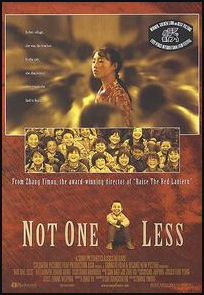 In recent years, Zhang has been accused of selling out to the Chinese government. Some have even accused him of being a kind Chinese Leni Riefenstahl, the German director who made propaganda films under Hitler. Michael Berry, who teaches contemporary Chinese culture at the University of California at Santa Barbara told the New York Times, “He went from being the renegade making films that were banned and an eyesore for the Chinese government to kind of being the pet of the government in some people’s eyes.”
In recent years, Zhang has been accused of selling out to the Chinese government. Some have even accused him of being a kind Chinese Leni Riefenstahl, the German director who made propaganda films under Hitler. Michael Berry, who teaches contemporary Chinese culture at the University of California at Santa Barbara told the New York Times, “He went from being the renegade making films that were banned and an eyesore for the Chinese government to kind of being the pet of the government in some people’s eyes.”
Zhang has served as an artistic advisor to the Communist leadership, promoted China abroad and produced a short film that helped China win the right to host the Olympics. He now is a member of he Chinese People’s Political Consultative Conference, China’s top political advisory body. Chen Xihe, a professor of film at Shanghai University, told the New York Times, “The government made him a cultural hero of China. Why would he continue to make movies that challenge the political system.”
Zhang was named artistic advisor to the Beijing Olympics. Chinese authorities have given his film favorable release dates and lobbied Hollywood executives for Oscars for his last three film. One of films opened at the Great Hall of the People in Tiananmen Square. Zhang also directed the military parade marking China's 60th anniversary on October 1 2009. This move seemed to further confirm that he had become the “artist in residence” to China's authoritarian government. [Source: National Public Radio, January 4, 2010]
Filmmaker Jia Zhangke is one of the most vocal critics in China of Zhang’s later films and his cozy relationship with the government. Jia told The New Yorker, ‘since “Hero” I have not liked his films. Not because they are kung-fu movies — I like kung fu movies — but because the film underscores power, that we should “bow down” before power. For a “harmonious world,” we should give up individual fights and efforts...The “authority of power,” the focus of his films, makes me extremely uncomfortable.”
Despite his state-sponsored assignments, Zhang denies losing his independence. He argues that censorship limits all Chinese directors equally, and he denies being burdened by the expectation of his new stature as a national icon. “I can't think about the pressure,” he told NPR. “If you thought about it, you wouldn't able to do anything. You have to have your feet on the ground.”
Outrage Over Zhang Yimou’s Extra Children
In May 2013, it was reported that Zhang Yimou fathered four to seven children, an extreme violation of China’s one-child policy. The People’s Daily, the Communist Party mouthpiece, alleged that Mr. Zhang had fathered seven children with four different women. According to the New York Times reported,: The news has ignited an angry online debate, with Internet users condemning the unequal application of the one child policy. The truth is: for the rich, the law is a paper tiger, easily circumvented by paying a “social compensation fee” — a fine of 3 to 10 times a household’s annual income, set by each province’s family planning bureau, or by traveling to Hong Kong, Singapore or even America to give birth. [Source: Ma Jian, New York Times, May 21, 2013]
In December 2013, Zhang admitted having three children with his current wife, according to a studio media posting. AFP reported: “Zhang Yimou has two sons and a daughter with his current wife, the Yimou Studio said in its verified account on Sina Weibo. That would mean Zhang has a total of four children including a daughter with his ex-wife. Zhang "would like to make a sincere apology to the public for the negative ramifications caused", said the posting by Yimou Studio, which says it is affiliated to the director. The disclosure comes after months of speculation that he has seven or eight children by three or four women. Yimou Studio dismissed those allegations as "untrue" and threatened to hold the rumour-mongers legally responsible. "The false allegations have seriously affected the normal life of Zhang Yimou's family and led to an egregious impact on society," said the statement. "We are collecting and sorting out relevant evidence against the rumour-mongers and preserve the right to pursue their legal liability." [Source: AFP, December 2, 2013]
“Reaction to the Yimou Studio statement was mixed. "He obviously violated the law, yet he shamelessly claims their life was seriously affected," said a comment posted on on Sina Weibo. But some argued having children was a human right and that it was time for the family planning policy to be shelved, which it was in 2016. "What is wrong with giving birth to children? Is it right to force pregnant women to abort their foetus?" said one user. Family planning officials in the eastern city of Wuxi, where Zhang's wife is registered as living, are investigating, reports in state-run media said. Zhang was willing to cooperate with the investigation and "accept commensurate penalties" according to national laws, said the Sina Weibo posting. If found guilty of breaching the policy, Zhang could be fined around $100,000, according to the per capita urban resident income in Wuxi and the number of children involved, the state-run Beijing News reported. But the official news agency Xinhua said that Jiangsu, the province which includes Wuxi, fines violators five to eight times the couple's joint income and said media estimates of the potential penalty ranged as high as 160 million yuan ($26 million).
In January 2014, it was announced that Zhang would be fined $1.2 million for having three kids beyond the one child limit. Associated Press reported: “A district government in the eastern city of Wuxi said in an online statement that investigators concluded that the director and his wife, Chen Ting, flouted family planning policies by having the children without approval and before they were married. “The fines are based in part on the couple’s annual income. The government of Wuxi’s Binhu district said they made a total of about $580,000 in the years before each of the children were born. “In late 2013, Wuxi family planning officials publicly complained they could not get in touch with Zhang. Zhang and Chen have 30 days to pay the fine. They may also seek an administrative review or file a court petition.[Source: Associated Press, January 9, 2014]
The China News Service, citing an unnamed family planning official in Wuxi, said Zhang and his wife had their two sons and daughter before they married in 2011 and Wuxi officials went to Beijing to try to find the couple and wrote to them more than 10 times,“There was never any effective response, and this created some difficulty for investigating and collecting evidence,” the China News Service report said. “When the couple had the three children, they had not carried out marriage registration procedures and did not obtain birth permit documents from the population and family planning authorities.” [Source: Chris Buckley, New York Times, January 9, 2014]
According to the New York Times “Despite their apologies, Mr. Zhang and Ms. Chen disputed the officials’ estimates of their past income, which were used to calculate the size of the fine, a propaganda office in Wuxi said in December. But the family planning bureau of Binhu District in Wuxi apparently rejected their claims and handed down the fine, which must be paid in 30 days unless the couple appeal. In December 2013 Zhang did a sit-down televised interview with the state-owned Xinhua news wire, and confessed. “I sincerely apologize for extra births to all of you,” the morose-faced auteur said, his eyes avoiding the camera. “I indeed did wrong.”
Biography of Zhang Yimou Reveals His Flaws and How He Was Blackmailed
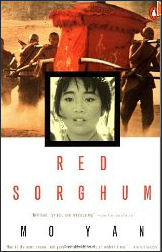
Patrick Frater wrote: “An unusual kiss-and-tell style biography of Zhang Yimou portrays the leading Chinese director as stubborn yet credulous and manipulable, lousy at personal communication, and a victim of emotional blackmail. The book, “Fate: Zhang Yimou the Lonely,” written by his script consultant of 16 years, Zhou Xiaofeng, makes allegations that are tougher still about Zhang Weiping (no relation), Zhang Yimou’s producer for over a decade. [Source: Patrick Frater, The People’s Daily, Variety, March 11, 2015]
“Zhou claims that Zhang Weiping preyed on the director’s many flaws to position himself as Zhang Yimou’s savior for a period between 1997 film “Keep Cool” through to 2012 wartime melodrama “The Flowers of War,” after which their relationship ended. Zhou says that Zhang Weiping disguised third-party investments in a string of movies as his own equity and lied about budgets in order to avoid paying dividends and salaries. Zhang Weiping invested RMB128 million ($20.8 million) in “Flowers” instead of the RMB650 million ($107 million at current exchange rates) he publicly stated, says Zhou.
“Zhang Yimou was not paid his directing fees until April 2010 for many of his best known films in the last decade — including “Hero” (2002), “The House of Flying Daggers” (2004), “Riding Alone for Thousands of Miles” (2005), “Curse of the Golden Flower” (2006) and “A Simple Noodle Story” (2009). “Zhang Yimou was easy to manipulate because he rarely bothered to read a contract, never bothered to check anyone’s assertions or claims, and took no interest in any of his staff beyond their immediate working environment, Zhou says in the book.
“And Zhang Yimou had dark secrets that Zhang Weiping first manipulated and later betrayed. Zhou says that Zhang Weiping and his wife knew of Zhang Yimou’s lengthy affair with superstar actress Gong Li, and that they helped cover up Zhang Yimou’s fathering of three children in breach of China’s one-child policy. The book says that Zhang Weiping deliberately sabotaged the relationship between director and muse through a series of lies and rumors. Zhou also suggests — but is less specific — that Zhang Weiping was the whistle-blower who, after the financial bust of “Flowers,” informed the authorities of Zhang Yimou’s illicit family. That move may have backfired, however, as Zhang Yimou’s rocky financial circumstances were revealed when he was ordered in 2014 to pay a fine of over RMB7.4 million ($1.05 million) for breaching the country’s birth control policy. Zhou says that Zhang Yimou had no income in 2000.
Zhang Yimou: the Filmmaker
Zhang made a lot of movies that won critical acclain. “Red Sorghum” (1987), which won the Golden Bear at the Berlin Film Festival and achieved critical and commercial success, both internationally and domestically. Red Sorghum crackles with dynamic edits, striking close-ups, and gorgeously photographed images. Later Zhang made “Ju Dou” (1989), which won Best Film at the Chicago Film Festival and garnered an Academy Award nomination. His next film, “Raise the Red Lantern” (1992), widely considered his finest, also concerned a woman married into a controlling, abusive patriarchal world. Just as critics seemed to have identified a specific Zhang Yimou style, he released “The Story of Qiu Ju” (1992), which is about a pregnant peasant women seeking legal justice after her husband is beaten by a village leader. The Story of Qiu Ju won the Golden Lion (Best Picture) at the 1992 Venice Festival. In 1997 he released the comedy Keep Cool, featuring Jiang Wen, who starred in “Red Sorghum”. In 1999, his film “Not One Less” won the coveted Golden Lion at the 1999 Venice Film Festival. [Source: chinaculture.org, January 18, 2004]
John A. Lent and Xu Ying wrote in the “Schirmer Encyclopedia of Film”: Zhang began his career as a cinematographer, drawing attention for his work on “One and Eight” (1984). He also was cinematographer for “Yellow Earth” (1984), which is regarded as the signature work of China's "Fifth Generation" of filmmakers. He also won three best actor awards from various groups for his role in “Old Well” (1987). “Zhang's directing started with “Red Sorghum” (1987) and by 2004 he had completed at least fifteen other movies. “Hero” (2002) and “House of Flying Daggers” (2004) were nominated for Academy Awards for best foreign-language film. [Source: John A. Lent and Xu Ying, “Schirmer Encyclopedia of Film”, Thomson Learning, 2007]
“Zhang changed his style on occasion, becoming a master of the happy-sad ending, as in Xingfu shiguang (Happy Time, 2001) and The Road Home, and later, moving to the action-filled, martial-arts genre with peculiar twists that differed from the traditional Hong Kong kung fu films. Critics in China have panned his latest works, writing that they have illogical plots and weak characters and were designed specifically for North American audiences. Hero broke box-office records in China for domestic movies, and House of Flying Daggers was a financial success in both China and the United States.
See Separate Article ZHANG YIMOU'S ACCLAIMED FILMS AND FLOPS factsanddetails.com
Zhang Yimou’s Non-Film Projects
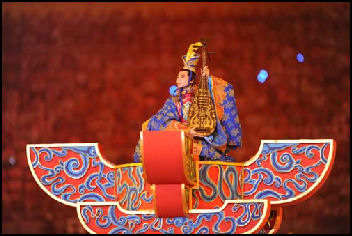
2008 Beijing Olympic
Opening Ceremony
Zhang has appeared at a number of film festivals and has been engaged in a number of non-film projects. In late 1990s, Zhang produced stage versions of Puccini's “Turandot” and Mozart's “The Magic Flute”. He has served as president of the jury at the Tokyo Film Festival and staged staged Puccini’s opera “Turandot” on the grounds of the Forbidden City before a nightly audience of 36,000 in 1998. Zhang directed a folk musical and staged it outdoors in 2003. In 2006, he directed Tan Dun’s “First Emperor” for the New York City’s Metropolitan Opera.
Zhang Yimou is one of the pioneers of the Chinese outdoor extravaganza — outdoor performances that combine theater and tourism spectacle. He produced “The Impression of Liu Sanjie”, an outdoor spectacle staged in Guangxi Province, in south-west China, one of the country’s poorest regions. He later went on to produce shows in scenic spots like Hangzhou and Lijiang in Yunnan Province and was selected to do the Opening Ceremonies for the Olympics based in part on what he achieved in these shows.
Zhang organized a show that featured “a sky ablaze with fireworks, more than 600 drummers decked out in brilliant red in the square between the Water Cube and Bird’s Nest stadiums in Beijing” to welcome world leaders and their entourages to the Asia-Pacific Economic Cooperation summit meeting in 2014. [Source: Amy Qin and Becky Davis, Sinosphere, New York Times, November 20, 2014]
Zhang also produced the show at Hangzhou’s West Lake that welcomed world leader to the G20 meeting in Hangzhou in 2016. The show featured fireworks, elaborate props and a multitude of dancers. CCTV’s Xing Zheming reported: Through a remarkable feat of engineering, the platform for the show lies centimeters below the water surface, so it seems the actors are defying the laws of physics...It took the construction team two months to complete the lighting project. To add more Chinese traditional elements, we hung lamps resembling stars on all the trees surrounding the lake. Thanks to that, West Lake now looks like a landscape from a traditional Chinese painting,” G20 summit evening gala producer, Sha Xiaolan said. A ballet dancer said: “Usually, we only dance on special stages and training rooms, where there’s professional anti-skid glue. But now it’s more challenging to dance on the slippery floor. At first we could hardly even walk on the stage. But now, it’s much easier, thanks to these specially designed shoes.” [Source: CCTV America, September 1, 2016]
Zhang Yimou and the 2008 Olympic Opening Ceremonies
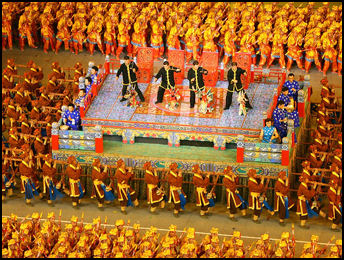
2008 Beijing Olympic
Opening Ceremony
Film director Zhang Yimou was selected to do the Opening Ceremonies in part based on what he achieved in staging outdoor performances that combined theater and tourist spectacle. He spent more than two years designing and rehearsing the show. The final rehearsals were held over several months in a secure Olympics compound.
Zhang said in an interview that the Olympics presented a once in lifetime opportunity that only a fool would pass up. “For a century, this is the most important time for the Chinese people to honor guests from all over the world. I took his job, to a great extent, because I wanted to do something for the Chinese people.”
After the event was staged Zhang Yimou said that he was pleased with the Opening Ceremonies show but said there were serious problems in the rehearsals. “I regret many things, many details of this performance, may things I cold have done better,” he told the Chinese media. “For example, there are performers who were injured. I blame myself for that . It might have well have been avoided if I had given more detailed instructions.”
See Separate Article OPENING CEREMONY AND STARS AT THE 2008 OLYMPICS IN BEIJING factsanddetails.com
Image Sources: Movie posters, IMDB, Wikipedia, Wiki Commons
Text Sources: New York Times, Washington Post, Los Angeles Times, Times of London, National Geographic, The New Yorker, Time, Newsweek, Reuters, AP, Lonely Planet Guides, Compton’s Encyclopedia and various books and other publications.
Last updated November 2021

